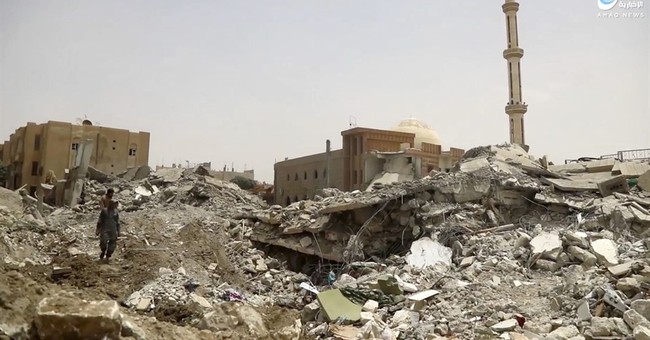Will Syria Be the Next Libya -- or Worse?

"Left unchecked, we have every reason to believe that Gadhafi would commit atrocities against his people," Obama said.
"Many thousands could die," he said. "A humanitarian crisis would ensue. The entire region could be destabilized, endangering many of our allies and partners. The calls of the Libyan people for help would go unanswered.
"The democratic values that we stand for would be overrun," he said.
Obama's Libyan allies did overthrow Gadhafi. But did democratic values triumph in Libya? What about U.S. national security interests?
The State Department's most recent country reports on terrorism -- describing the situation in 2015, four years after Gadhafi's removal -- declared that "violent extremist groups operate with impunity throughout Libya."
A Congressional Research Service report published this March made a similar assessment.
"Criminals and violent Islamist extremists have exploited these conditions," said CRS, "and the latter have strengthened their military capabilities and advanced their agendas inside Libya and beyond its borders."
Obama's decision to intervene in Libya's civil war harmed the interests of both the Libyan and American people.
On Sunday, after an engagement between "pro-Syrian regime" forces and U.S.-backed "Syrian Democratic Forces," the U.S. shot down a Syrian military aircraft over Syrian territory.
A statement put out by "Operation Inherent Resolve," the U.S.-led coalition operating in Syria and Iraq, said the coalition was not trying to fight the Syrian regime by shooting down its warplane.
"The coalition's mission is to defeat ISIS in Iraq and Syria," said the statement. "The coalition does not seek to fight Syrian regime, Russian, or pro-regime forces partnered with them, but will not hesitate to defend coalition or partner forces from any threat."
Yet, in April, Secretary of State Rex Tillerson described a step-by-step strategy for U.S.-backed regime change in Syria -- a regime change he envisioned would remove both ISIS and Assad and begin to create the sort of stable, peaceful government in Syria that Obama envisioned for post-Gadhafi Libya.
"Overall, the situation in Syria is one where our approach today and our policy today is, first, to defeat ISIS," Tillerson said, according to a White House transcript.
"So it's to defeat ISIS; it's to begin to stabilize areas of Syria, stabilize areas in the south of Syria, stabilize areas around Raqqa through ceasefire agreements between the Syrian regime forces and opposition forces," he said. "Stabilize those areas; begin to restore some normalcy to them. Restore them to local governance -- and there are local leaders who are ready to return, some who have left as refugees -- they're ready to return to govern these areas."
"Use local forces that will be part of the liberation effort to develop the local security forces -- law enforcement, police force," Tillerson said.
"In the midst of that, through the Geneva Process, we will start a political process to resolve Syria's future in terms of its governance structure," he said, "and that ultimately, in our view, will lead to a resolution of Bashar al-Assad's departure."
Despite the similarity between this administration's desire to see Assad's "departure" and the last administration's desire to see Gadhafi's, it would be a mistake to see Libya and Syria as similar nations.
Syria is 87 percent Muslim. But its Muslim population is divided between 74 percent who are Sunni and a combined 13 percent who are Ismailis, Shiites and Alawites -- the sect of the Assad family.
Ten percent of Syrians are Christians -- targeted for genocide by the Islamic State, not Assad. Three percent are Druze.
Syria borders Lebanon Turkey, Iraq, Jordan and Israel.
Pointing to the precedent set in the 12th century by Nur ad-Din and Salah ad-Din, al-Qaida leader Ayman al Zawahiri has cheered on the Syrian rebellion -- seeing Islamist control of Damascus and Cairo as strategic precursors to the conquest of Jerusalem.
After pursuing regime change in both Iraq and Libya, we have not been able to establish stability in either of these countries or deny their territory to terrorists.
This does suggest a basic rule that can be applied to Syria: A Middle Eastern regime that does not come to power through its own power cannot retain power.
Nor restrain terrorists.

No comments:
Post a Comment